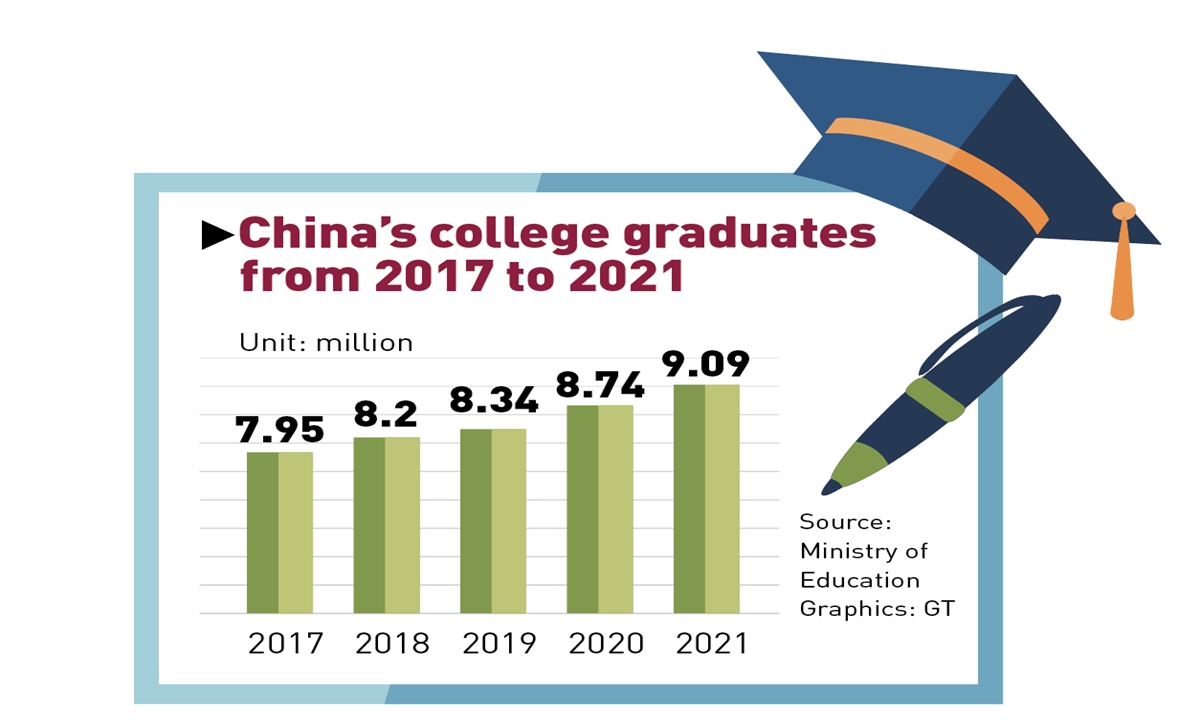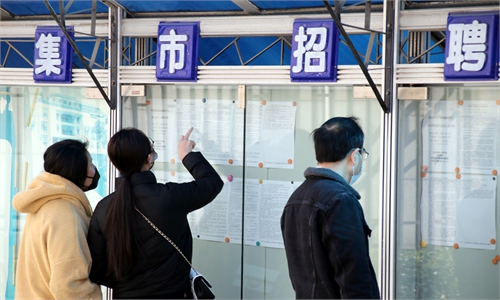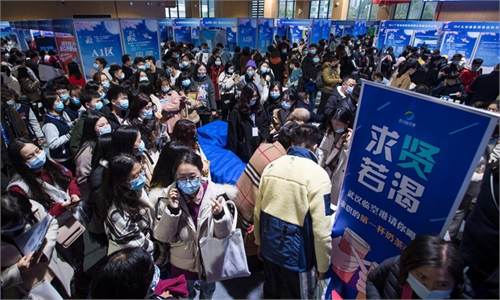China’s new college grads eye civil service jobs amid tight labor market
New grads face tight labor market, shift toward civil service positions

College graduates attend a job fair in an exhibition center in Shenzhen, South China's Guangdong Province on October 10, 2021. Photo: cnsphoto
A recent college graduate surnamed Liu used to dream about landing a job at a multinational corporation after her graduation, but now she is busy preparing for the civil service exams and applying for positions at banks and public schools simultaneously.
"Before the pandemic, I still desired to work for a foreign company, but now I prefer to work in state-owned enterprises (SOEs) or become a civil servant as these jobs are more stable since there might be uncertainties with the development of foreign companies due to the ongoing pandemic," Liu told the Global Times.
Liu is not alone among the more than 9 million college graduates in China in 2021 - a record high - who are looking to land a dream job amid mounting difficulties posed by the COVID-19 pandemic. As many industries and businesses struggled during the pandemic, employment opportunities at SOEs and civil service jobs have become the most popular among new college graduates over the past two years.
While China's quick recovery from the COVID-19 helped stabilize the jobs market, there are also mounting challenges for newly graduates to find their dream jobs amid a confluence of factors, including the fallout from the pandemic, shifting economic trends, tightening regulations in certain areas and an industrial transformation, analysts noted.
Opportunities, challenges
Thanks to China's robust economic recovery, graduates in 2021 have already seen a big boost in the range employment opportunities available compared with the past two years.
According to a survey released by Chinese recruitment website 51job.com in September, 82 percent of the graduates surveyed have applied for jobs. Among them, 81 percent - or around 66 percent of the total respondents - have already received offers, far exceeding the 42 percent recorded in 2020.
However, overall pressure of youth employment is still significant as the number of college graduates will reach 9.09 million in 2021, Ha Zengyou, a senior official from the National Development and Reform Commission (NDRC), the country's top economic planner, said at a press briefing on October 20.
Ha said that some small and medium-sized enterprises (SMEs) have scaled back recruitment and remain cautious for increasing the quotas affected by the sporadic COVID-19 cases across the country. Harsh weather conditions, including floods, have also impacted the jobs market, the official said.
The imbalanced supply and demand for talent in some industries have also resulted in the complexity for domestic employment market, Zhang Yi, CEO of iiMedia Research Institute, told the Global Times on Monday.
As China is currently going through a period of industrial restructuring and transformation in a bid to boost domestic consumption, tertiary industry are displaying the strongest demand for talent, said Zhang.
Analysts pointed out that more jobs now require applicants with specific skills such as data analysis or algorithm capabilities as a variety of enterprises are undergoing a digital transformation, which has resulted in a shortage of eligible talent.
The country's tightening regulations in some areas such as the tutoring sector since July has also had a significant impact on domestic youth recruitment, as most of employees in the tutoring industry are younger people.
The number of positions in the education sector opened for graduates has fallen between July and September, while the number of applications also fell sharply in August, according to the China Institute for Employment Research (CIER) Index. It indicates that the overall trend and performance of the country's job market decreased from 13.38 to 8.19, according to the newly released report from the CIER of Renmin University of China and the Zhaopin.com job platform on Monday.

Graphics: GT
Shifting preferences
Apart from the difficulties in landing a job in certain industries, preferences among new college graduates are also shifting.
Jobs at SOEs, civil service jobs, banks and other areas that are viewed as "stable" have become the most popular jobs for graduates to begin their career. Multiple graduates told the Global Times on Monday that SOEs and civil service jobs are their first picks.
Zhang Xi, a master student from the Henan University of Technology, told the Global Times that she is most interested in applying for civil service jobs or positions at SOEs that fit her major.
"Civil service jobs are more stable and have a relatively lower risk compared with internet companies," said Zhang, adding that the majority of her peers are now more inclined to take the civil service examination as a result of the pandemic and layoffs at some internet companies and private tutoring institutions.
Meanwhile, there are increasing opportunities for civil services jobs this year. Since the beginning of 2021, local authorities across the country have given greater priority to promoting the employment of college graduates and young people by creating more job opportunities at government departments, public institutions and SOEs, especially by expanding market-oriented employment channels, said Ha.
A human resource manager who works for a bank based in Southwest China's Chongqing Municipality told the Global Times on Monday that the bank has received more applications in 2021 compared with last year.
However, there are still great opportunities in other industries, according to Zhang, emphasizing that graduates can also broaden their options for employment based on their needs.
For example, many graduates majoring in English might have preferred to work as English teachers in educational institutions previously, but now the market demand for vocational training such as adult English training and business English is booming, providing a host of new opportunities.


